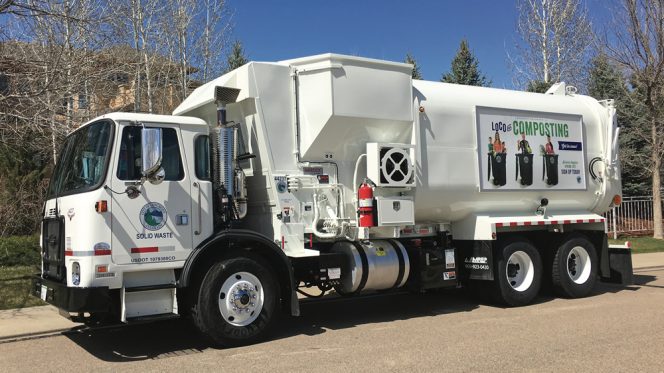Replacing 90,000 gallons of diesel fuel with RNG will reduce greenhouse gas emissions by about 1,000 metric tons of carbon dioxide equivalents annually.
Marsha Johnston
BioCycle May/June 2019
By the end of 2019, the City of Longmont, Colorado, expects to be fueling 11 new trash trucks with compressed natural gas (CNG) from the biogas that is currently flared at its wastewater treatment plant (WWTP) anaerobic digester. “The genesis of this project was simply trying to find a use for the biogas being created at our wastewater treatment plant,” explains John Gage, a civil engineer in Longmont’s Environmental Services Group, adding that currently, 75 percent is flared because only a portion is needed for heat at the WWTP.

The City of Longmont, Colorado expects to be fueling
11 new collection vehicles by the end of 2019 with RNG from the biogas generatedat the city’s wastewater treatment plant. Photo courtesy of City of Longmont
With 11 of its existing diesel trucks coming due for replacement, the city evaluated diesel versus renewable fuels. “We determined that renewable natural gas (RNG) was better than diesel,” says Gage. “The reason is two-fold. One, we have no control over the price of diesel, so cost is a component. And two, if you look at the carbon emissions from diesel compared to RNG, the difference is significant. Natural gas is lower than diesel, but RNG is lower still.”
Longmont estimates that the new facility should save the municipality approximately $400,000/year, between money not used to buy 90,000 gallons of diesel fuel and earning RIN credits through the U.S. Environmental Protection Agency’s Renewable Fuel Standard (RFS) program. The RINs (Renewable Identification Numbers) can be sold to obligated parties, which include petroleum refiners and importers of refined fuels to the U.S. (See “Biogas To RNG Projects: What, Why And How“)
The City received two grants for the RNG project — $1 million from the Colorado Department of Local Affairs for the biogas cleaning equipment, and $385,000 from the Regional Air Quality Council to cover all but $5,000 of the $40,000 cost differential for the CNG trash trucks. Replacing 90,000 gallons of diesel fuel with RNG will reduce greenhouse gas emissions by about 1,000 metric tons of carbon dioxide (CO2) equivalents annually.
Gas Cleaning
The BioCNG 100 biogas cleaning system from Unison Solutions is being installed. The system has multiple phases, starting with hydrogen sulfide removal in a stainless steel vessel containing an iron-based treatment media. The gas moves to a treatment skid with a glycol chiller to remove moisture, and then to a carbon-based media to remove all of the siloxanes and volatile organic compounds (VOCs). The last phase is a membrane system to remove CO2. The system produces between 370 and 600 per day of gasoline gallon equivalents. The cleaned biogas is compressed from 100 psi into 4,000-psi CNG necessary to be used in vehicles. Gage adds that the CNG will be stored at the WWTP in six tanks, each holding 18,600 cubic feet for a total of 111,600 cubic feet.
Fort Collins-based CGRS Inc.’s CNG Construction Services is the project manager and construction contractor, and designed the new fueling station. Carollo Engineers designed the biogas treatment system. A pipeline channels methane gas from the WWTP to the gas treatment equipment to on-site storage tanks and later to the fueling site on the northwest corner of an adjacent property. CGRS will build a 17,000-sq. ft. building with four indoor fueling bays and a two-story, 5,000- sq. ft. administration building on that site. “Longmont will be the first city on the Front Range to implement a renewable vehicle fuel project; other utilities have been looking at Longmont as a model for their operations,” says Becky Luna, Design Manager at Carollo. The new facility should go online December 1, says Gage. An additional five diesel trucks will be replaced in 2021.
Marsha W. Johnston, an editor with Earth Steward Associates, is a Contributing Editor to BioCycle.













